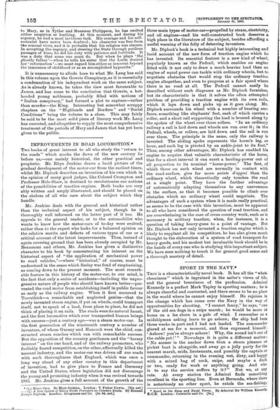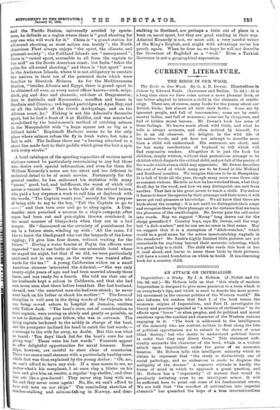SPORT IN THE NAVY.*
THIS is a characteristically naval book. It has all the "what- cheeriness " which is ingrained in the sailor's views of life, and the general breeziness of the profession. Admiral Kennedy is a perfect Mark Tapley in sporting matters ; he is always cheerful and contented, and there seems to be no place in the world where he cannot enjoy himself. He rejoices in the change which has come over the Navy in the way of opportunities for shooting. "I cannot fancy," he says, "one of the old sea dogs in a snipe marsh ; he would be more at home on a lee shore in a gale of wind. I remember as a midshipman asking leave to go ashore; the ship had been three weeks in port and I had not landed. The commander glared at me for a moment, and thus expressed himself: 'Ashore! you're always ashore! Why, the sound isn't out of the cable yet !' " Nowadays it is quite a different matter: "No sooner is the anchor down than a steam pinnace or picket boat is alongside, and away go a jolly party for the nearest marsh, mids, lieutenants, and possibly the captain or commander, returning in the evening wet, dirty, and happy with a mixed bag of cock, snipe, and maybe a duck or two, ready for work or anything going. And who is to say the service suffers by it P" Not we, at any rate. At every station the Admiral finds something excellent in the sporting line. Even at Bermuda, where there is notoriously no other sport, he extols the sea-fishing; • Sport in the Navy and Naval Yarns. By Admiral Sir William Renned.11 R.C.B. London Constable and Co. [68.] and the Pacific Station, universally avoided by sports- men, he defends as a region where there is "good shooting for any one who will work for it." China is "a grand station for all-round shooting, as most sailors can testify " ; the North American Fleet always enjoys "the sport, the climate, and pleasant society " ; the Falkland Islands are " unsurpassed " ; there is "varied sport, accessible to all from the captain to the mid" on the South American coast; but India "takes the palm for all-round shooting," and there is "fair sport" even in the Andaman Islands, where it is not obligatory to emulate the natives in their use of the poisoned darts which were familiar to Sherlock Holmes. As for the Mediterranean Station, "besides Albania and Egypt, there is grand sport to be obtained all over, as every naval officer knows—cock, snipe, duck, pig and 'deer and chamois ; red-deer at Dragomestia; ibex In Antimilo and Karamania ; mouffion and boars in Sardinia and Corsica ; red-legged partridges at Ayas Bay, and on all the islands of the Greek Archipelago, and on the African coast, &e Fishing is not the Admiral's favourite sport, but he had a feast of it at Halifax, and was somewhat scandalised by the lumbermen's method of catching salmon in the Musquadobit with "a huge square net as big as a billiard table." Esquimalt Harbour seems to be the only place where salmon refuse the fly in fresh water, but take a bait in salt. The Indians there use "a herring attached to a short line made fast to their paddle which gives the bait a spin with every stroke."
A brief catalogue of the sporting capacities of various naval stations cannot be particularly entertaining to any but those who desire such special information, and even for them Sir William Kennedy's notes are too short and too deficient in technical detail to be of much service. Fortunately for the general reader, he has enlivened his statistics with many "yarns," good, bad, and indifferent, the worst of which will amuse a vacant hour. There is the tale of the retired bo'sun, who paid a boy sixpence a week to call him at daybreak with the words, "The Captain wants you," merely for the purpose of being able to say to the boy, "Tell the Captain to go to — !" and then turn over and go to sleep again. A Com- mander once preached a sermon to a ship's company, after ropes had been cut and gun-sights thrown overboard, in the usual manner of bluejackets when they are in a bad temper. He "discoursed on the certainty. of punishment for sin in a future state, winding up with : All the same, I'd like to know the blackguard who cut the lanyards of the lower rigging; I'd give him four dozen, without waiting for the future.' " During a water famine at Payta the officers were requested "not to use baths at the one miserable hotel where we stayed the night, but that if we did, we were particularly cautioned not to use soap, as the water was wanted after- wards for the tea!" A young Californian widow on a small American steamer interested the Admiral :—" She was only twenty-eight years of age, and had been married already three times, and was ready for a fourth. She told me that one of her husbands kept a saloon in California, and that she had seen seven men shot there before breakfast. Her last husband, she said, was the smartest man she had ever struck ; he never went back on his father or shook his mother !" The force of discipline is well seen in the dying words of the Captain who was being rowed ashore to hospital at Jamaica, smitten with Yellow Jack. "The boat's crew, out of consideration to their captain, were rowing as slowly and gently as possible, so as not to disturb the poor fellow, who was in extremis. The dying captain beckoned to the middy in charge of the boat, and the youngster inclined his head to catch the last words,— a message to the wife far away, no doubt. But this was what he heard : Ten days' black list for the boat's crew for not giving way.' These were his last words." Funerals appear to offer delightful opportunities for naval humour. Some ships, however, are careful to steer clear of cemeteries. There was once a mail steamer with a particularly healthy crew, which fact was thus explained by the young doctor : "Oh, no ; vm can't afford to have any sick. If a man comes to me, no matter what's his complaint, I at once clap a blister on his back and give him an emetic, a regular top-shelfer,' and clear bun out like a gun-barrel ! They never stop long with me, Sir, and they never come again! No, Sir, we can't afford to have sick men on our ships." The concluding sketches of reindeer-stalking and salmon-fisYng in Norway, and deer-
stalking in Scotland, are perhaps a little out of place in a book on naval sport, but they are good reading in their way. Admiral Kennedy is not, we must add, a very careful writer of the King's English, and might with advantage revise his proofs again. When he does so, we hope he will not describe the Governor of Baghdad as a "wadi." Even a Turkish Governor is not a geographical expression.























































 Previous page
Previous page